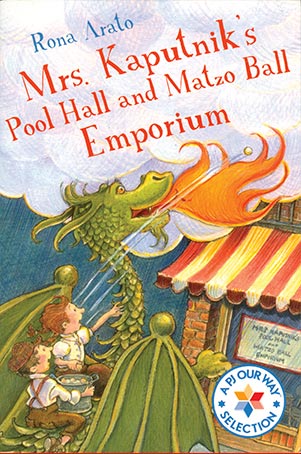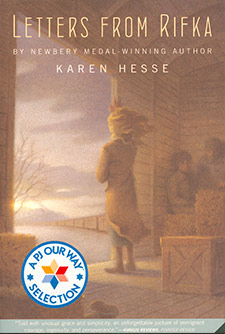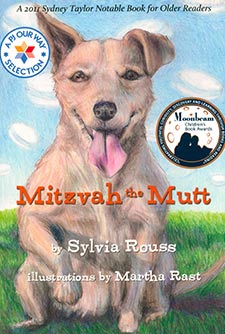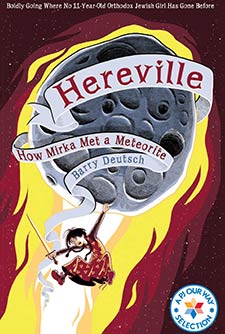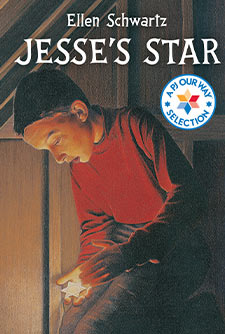Mrs. Kaputnik's Pool Hall and Matzo Ball Emporium
Shoshi and Moshe are miserable and hungry in their tiny Russian village.
Escaping to New York and finding their missing father is their only way out!
Luckily, Snigger the dragon is on their team…
Escaping to New York and finding their missing father is their only way out!
Luckily, Snigger the dragon is on their team…
Average Rating
( hint: Login to leave a review! )
82 Reviews
Leave Review
What the Book is About
Jewish Content & Values
Positive Role Models
Content Advisory
Talk it Over!
More for You
What the Book is About
Ruth Kaputnik and her two children, Shoshi (age ten) and Moshe (age eight), are living hand to mouth in a tiny Russian village as Papa chases his fortune in America. When a mysterious peddler’s egg hatches into a fire-breathing dragon they name Snigger, their luck begins to change. They travel by ship to New York in search of their father, have many exciting adventures, and meet some really quirky characters. The story ends happily, with the whole family reunited … dragon and all.
Jewish Content & Values
- Yiddish phrases and Yiddish humor are found throughout the book.
- The symbolism of Passover and freedom are major underlying themes: the family leaves the shtetl (small Jewish village) on Passover eve to journey to America, where they can finally live as free Jews; Mrs. Kaputnik’s Passover matzo balls are used to battle Cossacks and open a new business; and Shoshi and Moshe manage to free their papa from slavery at the hands of Nick the Stick.
- The Kaputniks take on each challenge with hatmada (determination and persistence). They never give up searching for Papa and, despite their desperate financial situation, they work hard to make the restaurant a success.
- Family and kehillah (community) are highlighted as Shoshi and Moshe work together to help their mother, care for their dragon, and search for their father. Mrs. Kaputnik unites the local community in standing up against Nick the Stick, the local gangster.
Positive Role Models
- Mrs. Kaputnik shows love and devotion to her family and community, and she never gives up searching for her husband.
- Shoshi and Moshe are dedicated and resourceful children. They are willing to make peace with bullies and forgive and forget if it means finding their father and making a home in America.
- The rabbi in the shtetl is wise and fair as he sends the Kaputniks on their journey.
Content Advisory
This book is full of exciting adventures but is unlikely to scare most kids. The Cossack attack at the beginning is thwarted almost immediately – and comically – by Snigger the Dragon, as is the attack on Moshe and Shoshi by Ziggy and his band of bullies. Although the family’s financial situation is desperate, positive attitudes make it seem like a challenge that can easily be overcome. The various threats by local gangster Nick the Stick never come to fruition, and when it turns out that Nick is the one who kidnapped Papa Kaputnik, the family is able to help Papa return healthy and unharmed.
Talk it Over!
Shoshi and Moshe eventually manage to forgive Ziggy, a bully, so that he can help them find their father. Can you think of a time when you’ve made peace with a sibling, friend, neighbor, or classmate in order to achieve a common goal?
More for You
Shtetl is Yiddish for “town.” In the 19th century, a shtetl was a Jewish community in Eastern Europe. Jews were restricted from living in major cities. Despite the fact that shtetls were usually overcrowded and impoverished, they are often described as having had an unusually high degree of warmth, with a strong emphasis on community, charity, and a very traditional synagogue/rabbi structure. Shtetl life is famously depicted in the musical Fiddler on the Roof.
What the Book is About
What the Book is About
Ruth Kaputnik and her two children, Shoshi (age ten) and Moshe (age eight), are living hand to mouth in a tiny Russian village as Papa chases his fortune in America. When a mysterious peddler’s egg hatches into a fire-breathing dragon they name Snigger, their luck begins to change. They travel by ship to New York in search of their father, have many exciting adventures, and meet some really quirky characters. The story ends happily, with the whole family reunited … dragon and all.
Jewish Content & Values
Jewish Content & Values
- Yiddish phrases and Yiddish humor are found throughout the book.
- The symbolism of Passover and freedom are major underlying themes: the family leaves the shtetl (small Jewish village) on Passover eve to journey to America, where they can finally live as free Jews; Mrs. Kaputnik’s Passover matzo balls are used to battle Cossacks and open a new business; and Shoshi and Moshe manage to free their papa from slavery at the hands of Nick the Stick.
- The Kaputniks take on each challenge with hatmada (determination and persistence). They never give up searching for Papa and, despite their desperate financial situation, they work hard to make the restaurant a success.
- Family and kehillah (community) are highlighted as Shoshi and Moshe work together to help their mother, care for their dragon, and search for their father. Mrs. Kaputnik unites the local community in standing up against Nick the Stick, the local gangster.
Positive Role Models
Positive Role Models
- Mrs. Kaputnik shows love and devotion to her family and community, and she never gives up searching for her husband.
- Shoshi and Moshe are dedicated and resourceful children. They are willing to make peace with bullies and forgive and forget if it means finding their father and making a home in America.
- The rabbi in the shtetl is wise and fair as he sends the Kaputniks on their journey.
Content Advisory
Content Advisory
This book is full of exciting adventures but is unlikely to scare most kids. The Cossack attack at the beginning is thwarted almost immediately – and comically – by Snigger the Dragon, as is the attack on Moshe and Shoshi by Ziggy and his band of bullies. Although the family’s financial situation is desperate, positive attitudes make it seem like a challenge that can easily be overcome. The various threats by local gangster Nick the Stick never come to fruition, and when it turns out that Nick is the one who kidnapped Papa Kaputnik, the family is able to help Papa return healthy and unharmed.
Talk it Over!
Talk it Over!
Shoshi and Moshe eventually manage to forgive Ziggy, a bully, so that he can help them find their father. Can you think of a time when you’ve made peace with a sibling, friend, neighbor, or classmate in order to achieve a common goal?
More for You
More for You
Shtetl is Yiddish for “town.” In the 19th century, a shtetl was a Jewish community in Eastern Europe. Jews were restricted from living in major cities. Despite the fact that shtetls were usually overcrowded and impoverished, they are often described as having had an unusually high degree of warmth, with a strong emphasis on community, charity, and a very traditional synagogue/rabbi structure. Shtetl life is famously depicted in the musical Fiddler on the Roof.

